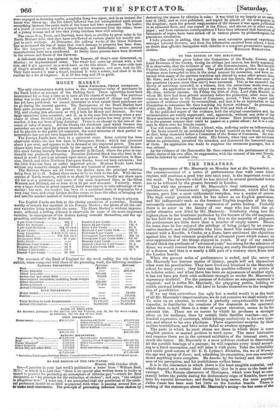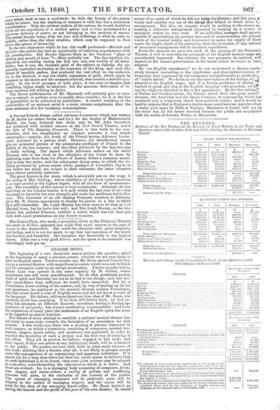THE THEATRES.
The appearance of Mr. Macready on Monday last at the Haymarket, as the commencement of a series of performances that with some inter- ruption will continue a good way into next year, is the important event of the week. The farewells which he has uttered in several provincial towns are to be followed by the greater farewell in London.
That with the prospect of Mr. Macready's final retirement, and the reminiscence of Transatlantic indignities, the audience, which filled the theatre, gave him a most enthusiastic reception, was a matter of course. The high social position which he has taken as an English gentleman, and his indisputable rank as the foremost English tragedian of his day, necessarily commanded a strong expression of public feeling. Probably there is no actor in the history of our stage who has held the pe- culiar situation now filled by Mr. Macready. Gradually rising into the highest place in the histrionic profession by the decease of the old magnates, be has held the post undisputed, so long that to the majority of playgoers his predecessors are little more than a number of empty names. Hence, for some time he has enjoyed the privilege of being judged by no compa- rative standard, and the juveniles who have heard him unfavourably con- trasted with a Kemble, a Cooke, or a Kean, have attributed the objections against him to that common prejudice of advanced years which causes an over-appreciation of the things enjoyed in youth. If any of our readers should think the predicate of "advanced years" too strong for the admirers of Kean, we would remind them that the young are really the chief supporters of a theatre, and that it is nearly a fifth part of a century since_Kean trod the London boards.
When the present series of performances is ended, and the career of Mr. Macready has become matter of history, people will ask themselves what were his peculiarities. They have lived and breathed in the Macready school for many years; they have seen his qualities reflected in artists of an inferior order; and when there has been an appearance of another style, it has not been put forth with sufficient strength to render Mr. Macready's supremacy doubtful. For the purpose of definition an adequate contrast is required; and to define Mr. Macready, the playgoing public, holding no visible contrast before them, will have to betake themselves to the imagina- tion of possibilities.
If we say that naturalness (an ugly but a useful word) is at the basis of all Mr. Macready's impersonations, we do not conceive we shall widely err. To seize on an emotion, to render it perfectly comprehensible to every capacity, to familiarize the creations of the dramatist to the spectator, rather than to hold them in a state of august elevation, seems to be his constant aim. There are no means by which he produces 'a stronger effect on his audience, than by certain little familiar touches—say, an ironical expression of contempt, which belongs exclusively to his own man- ner, and almost to his own physique. These expressions surprise by their sudden truthfulness, and have never failed to awaken sympathy. The parts in which he most shines are those in which there is some tangible passion or mental position to work upon. The more intricacies and nuances there are in the outward exhibition of the internal state, so much the better. Mr. Macready is a most sedulous student in discovering all the possible bearings of a passage; he will regulate every detail accord- ing to a fixed conception, and will utter it with point. Take the irritability and senile good-nature of Sir E. B. Lyttoc.'s Richelieu, the wo of Werner, the age and agony of Lear; and, admitting his conception, you can scarcely desire anything more complete. He dazzler by his variety and the acute- ness of his perception, and his truthfulness strikes home. It is in the characters in which there is tfie least tangible material, and which depend on a certain ideal elevation likit he is seen to the least ad- vantage. Thl Roman characters of Shakspere, which were kept so con- stantly before the public during the declamatory reign of Kemble, have not been his especial favourites; and during his long career, the once popular Julius Caesar has been seen but little on the London boards. There is nothing of the statuesque about Mr. Macready's acting—he has none of the poses which tend to-awe a multitude: he feels the beauty of the poetry which he-utters, but the marking of measure is with him but a secondary consideration. With the evident realism of his notions, he would doubtless reject all the expedients of a studied action and a voice modulated for a sonorous delivery of metre, as not belonging to the modesty of nature. The actual human being, with his joys and sufferings, is what he seeks to exhibit, rather than the ideal creation, which may be supposed to float above the sphere of humanity. In the two characters which be has this wea' performed-Macbeth and Hamlet-the public has had an opportunity of renewing acquaintance with his peculiarities. Did Hamlet impress them as the idealized "glass of fashion and mould of form "?-Most probably riot. The fine intellect dis- played in the readirig during the first two acts Was worthy of all admi- ration; but it-was the fantastic grief of the address to Ophelia, the ap- parently unstudied exultation at the exposure of the King, and such like bursts of tangible pathos, that produced the real effect on the audience. So in the Macbeth, it was the visible expression of guilt, which might be common to the thane and the meanest criminal, that created a terrible sym- pathy. In the level passages of both plays, it was easy to imagine that something higher might be attained; but the accurate delineation of in- tense emotions left nothing to desire.
The future performances of Mr. Macready will probably give us occa- sion to extend, or perhaps even to modify these remarks; for it is the fate of generalities to be corrected by particulars. A careful watching of the peculiarities of an eminent artist is a more sincere compliment than the mere utterance of a few laudatory commonplaces.



























 Previous page
Previous page